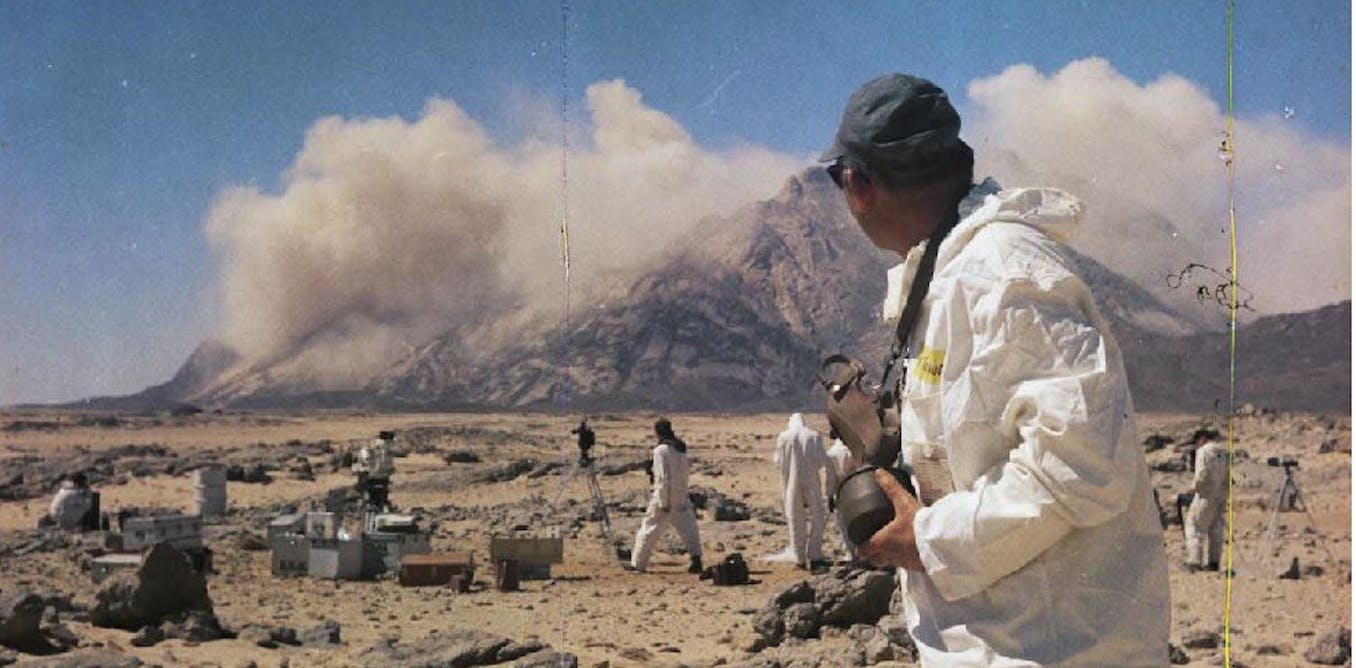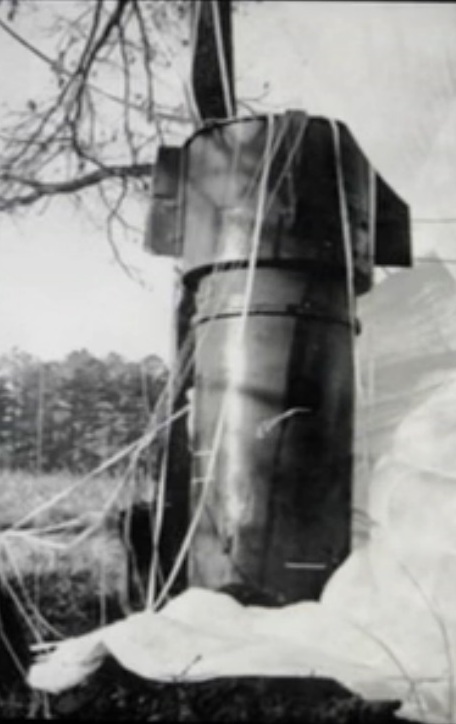Shouts to @east for his post that led me to make this thread.
I see @88m3 made it years ago in HL and it didn't gain any traction.

 www.thecoli.com
www.thecoli.com

 theconversation.com
theconversation.com
A fifth atmospheric test in Algeria? French plans to reactivate Reggane
Recently declassified French documents show that, notwithstanding Algerian protests, French officials likely prepared to conduct a fifth atmospheric test at Reggane in 1964. General Jean Thiry, in charge of the French nuclear test sites from 1963 to 1969, alluded in spring 1963 to “the reopening of the Hammoudia polygon [test site] for an atmospheric shot in 1964,” using another name for the blast zone next to Reggane.
Read more: Geometrically baffling ‘quasicrystals' found in the debris of the first-ever nuclear blast
Thiry and other top French brass worried about French capabilities to conduct underground tests following the infamous Béryl accident in 1962. Radioactive fallout from the poorly contained shot had contaminated the French state ministers Pierre Messmer and Gaston Palewski, French soldiers, and nearby Algerian communities.
Thiry was not the only French military officer to discuss new plans for Reggane. In March 1963, the Brigadier General Plenier, in the military engineering division, mentioned “the resumption of [radiation] protection experiments during an atmospheric shot planned for the beginning of 1964.” Even if he had faith in these plans moving forward, he noted that his work would “depend on details, not yet set, of the test conditions,” like the precise location or the altitude of the explosion. On March 29, 1963, the Division General Labouerie, also in military engineering, took his turn celebrating: “It could be possible that favourable conditions might come together for the atmospheric explosion planned for 1964.”
Back then, at least three military officers deep inside the French nuclear program eagerly expected the reactivation of the Reggane site. No atmospheric test took place in 1964, however. In the course of his meeting with de Gaulle at the Château de Champs near Paris in May 1964, the Algerian President Ben Bella had asked his French counterpart not to resume, if possible, atmospheric tests in Algeria. De Gaulle refused to guarantee it.
By the end of 1964, he was still discussing with his cabinet the possibility of conducting atmospheric explosions at Reggane, while they awaited the completion of France’s Pacific test site (le Centre d’Expérimentations du Pacifique) in Polynesia.
Read more: A restart of nuclear testing offers little scientific value to the US and would benefit other countries
Even if French officials ultimately respected Ben Bella’s request, in December 1966 a top official at the French Atomic Energy Commission (CEA), Jean Viard, assessed the potential impacts of reactivating Reggane. Viard did not think the option was optimal. De Gaulle would have wanted to keep the site anyway. In a note to his cabinet in February 1967, he asked them to study how it might be possible to maintain a French presence at Reggane, a site that could, without substantial renovations, facilitate only atmospheric tests.
Nuclear archives and Algerian independence
Nothing guaranteed French abstention from atmospheric nuclear tests in independent Algeria. Recent declassifications have revealed French plans to resume these atmospheric tests, notwithstanding the protests from the highest levels of the new Algerian state.
Notwithstanding years of negotiations shrouded in secrecy, French authorities would fail to reach a decision about the use of the Reggane site before the Algerian authorities acquired it. Some French archives, including military and diplomatic files from this period, remain unavailable for historical research. But glimpses suggest the importance of this episode — involving French plans abandoned during bilateral negotiations — for the French nuclear weapons program, for the new Algerian state, and for the détente between these two countries. New access to French nuclear archives, despite gaps, has begun to illuminate little known aspects of Algerian Independence on its sixtieth anniversary.
This article was originally published in French
french nuclear testing in algeria and russian nuclear testing in ukraine/turkmenistan/uzbekistan led to (probably tens of) thousands of deaths all the way in sub-saharan africa. nuclear testing in america led to around 450k excess deaths in 20 years (link) and this is in a country that pretends to care about its citizens. do you think putin will care about africans at all when deciding "do i wanna make a cleaner fission bomb or drop one of these older high fallout nukes i have laying around?"
I see @88m3 made it years ago in HL and it didn't gain any traction.

France drops nuclear bomb on Algeria
French leave toxic legacy in Algeria By Lamine Chikhi IN EKKER, Algeria | (Reuters) - Radioactive material is seeping out from this Sahara desert mountain where French scientists conducted nuclear tests in the 1960s, contaminating the soil and poisoning relations between France and...
 www.thecoli.com
www.thecoli.com

France struggled to relinquish Algeria as a nuclear test site, archives reveal
The unprecedented declassification of French nuclear archives sheds light upon the nuclear tests in Algeria circa 1960.
 theconversation.com
theconversation.com
A fifth atmospheric test in Algeria? French plans to reactivate Reggane
Recently declassified French documents show that, notwithstanding Algerian protests, French officials likely prepared to conduct a fifth atmospheric test at Reggane in 1964. General Jean Thiry, in charge of the French nuclear test sites from 1963 to 1969, alluded in spring 1963 to “the reopening of the Hammoudia polygon [test site] for an atmospheric shot in 1964,” using another name for the blast zone next to Reggane.
Read more: Geometrically baffling ‘quasicrystals' found in the debris of the first-ever nuclear blast
Thiry and other top French brass worried about French capabilities to conduct underground tests following the infamous Béryl accident in 1962. Radioactive fallout from the poorly contained shot had contaminated the French state ministers Pierre Messmer and Gaston Palewski, French soldiers, and nearby Algerian communities.
Thiry was not the only French military officer to discuss new plans for Reggane. In March 1963, the Brigadier General Plenier, in the military engineering division, mentioned “the resumption of [radiation] protection experiments during an atmospheric shot planned for the beginning of 1964.” Even if he had faith in these plans moving forward, he noted that his work would “depend on details, not yet set, of the test conditions,” like the precise location or the altitude of the explosion. On March 29, 1963, the Division General Labouerie, also in military engineering, took his turn celebrating: “It could be possible that favourable conditions might come together for the atmospheric explosion planned for 1964.”
Back then, at least three military officers deep inside the French nuclear program eagerly expected the reactivation of the Reggane site. No atmospheric test took place in 1964, however. In the course of his meeting with de Gaulle at the Château de Champs near Paris in May 1964, the Algerian President Ben Bella had asked his French counterpart not to resume, if possible, atmospheric tests in Algeria. De Gaulle refused to guarantee it.
By the end of 1964, he was still discussing with his cabinet the possibility of conducting atmospheric explosions at Reggane, while they awaited the completion of France’s Pacific test site (le Centre d’Expérimentations du Pacifique) in Polynesia.
Read more: A restart of nuclear testing offers little scientific value to the US and would benefit other countries
Even if French officials ultimately respected Ben Bella’s request, in December 1966 a top official at the French Atomic Energy Commission (CEA), Jean Viard, assessed the potential impacts of reactivating Reggane. Viard did not think the option was optimal. De Gaulle would have wanted to keep the site anyway. In a note to his cabinet in February 1967, he asked them to study how it might be possible to maintain a French presence at Reggane, a site that could, without substantial renovations, facilitate only atmospheric tests.
Nuclear archives and Algerian independence
Nothing guaranteed French abstention from atmospheric nuclear tests in independent Algeria. Recent declassifications have revealed French plans to resume these atmospheric tests, notwithstanding the protests from the highest levels of the new Algerian state.
Notwithstanding years of negotiations shrouded in secrecy, French authorities would fail to reach a decision about the use of the Reggane site before the Algerian authorities acquired it. Some French archives, including military and diplomatic files from this period, remain unavailable for historical research. But glimpses suggest the importance of this episode — involving French plans abandoned during bilateral negotiations — for the French nuclear weapons program, for the new Algerian state, and for the détente between these two countries. New access to French nuclear archives, despite gaps, has begun to illuminate little known aspects of Algerian Independence on its sixtieth anniversary.
This article was originally published in French





